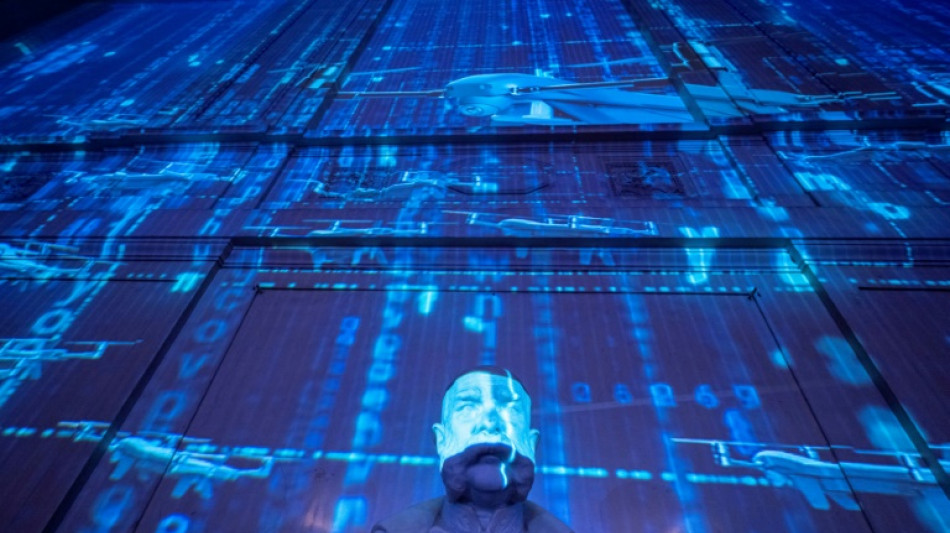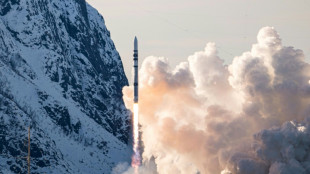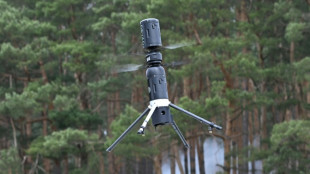
-
 Saka 'ready to go' after long injury lay-off: Arteta
Saka 'ready to go' after long injury lay-off: Arteta
-
Ingebrigtsen Sr, on trial for abusing Olympic champion, says he was 'overly protective'

-
 Tourists and locals enjoy 'ephemeral' Tokyo cherry blossoms
Tourists and locals enjoy 'ephemeral' Tokyo cherry blossoms
-
Khamenei warns of 'strong' response if Iran attacked

-
 France fines Apple 150 million euros over privacy feature
France fines Apple 150 million euros over privacy feature
-
UK PM urges nations to smash migrant smuggling gangs 'once and for all'

-
 Thai authorities probe collapse at quake-hit construction site
Thai authorities probe collapse at quake-hit construction site
-
France's Le Pen convicted in fake jobs trial

-
 Chinese tech giant Huawei says profits fell 28% last year
Chinese tech giant Huawei says profits fell 28% last year
-
Trump says confident of TikTok deal before deadline

-
 Myanmar declares week of mourning as hopes fade for quake survivors
Myanmar declares week of mourning as hopes fade for quake survivors
-
Japan's Nikkei leads hefty market losses, gold hits record

-
 Tears in Taiwan for relatives hit by Myanmar quake
Tears in Taiwan for relatives hit by Myanmar quake
-
Venezuela says US revoked transnational oil, gas company licenses

-
 'Devastated': Relatives await news from Bangkok building collapse
'Devastated': Relatives await news from Bangkok building collapse
-
Arsenal, Tottenham to play pre-season North London derby in Hong Kong

-
 Japan's Nikkei leads hefty equity market losses; gold hits record
Japan's Nikkei leads hefty equity market losses; gold hits record
-
Israel's Netanyahu picks new security chief, defying legal challenge

-
 Trump says US tariffs to hit 'all countries'
Trump says US tariffs to hit 'all countries'
-
Prayers and tears for Eid in quake-hit Mandalay

-
 After flops, movie industry targets fresh start at CinemaCon
After flops, movie industry targets fresh start at CinemaCon
-
Tsunoda targets podium finish in Japan after 'unreal' Red Bull move

-
 French chefs await new Michelin guide
French chefs await new Michelin guide
-
UK imposes travel permit on Europeans from Wednesday

-
 At his academy, Romanian legend Hagi shapes future champions
At his academy, Romanian legend Hagi shapes future champions
-
Referee's lunch break saved Miami winner Mensik from early exit

-
 Djokovic refuses to discuss eye ailment after shock Miami loss
Djokovic refuses to discuss eye ailment after shock Miami loss
-
Mitchell magic as Cavs bag 60th win, Pistons and T'Wolves brawl

-
 Mensik shocks Djokovic to win Miami Open
Mensik shocks Djokovic to win Miami Open
-
Duterte lawyer: 'compelling' grounds to throw case out

-
 What happens on Trump's 'Liberation Day' and beyond?
What happens on Trump's 'Liberation Day' and beyond?
-
Clock ticks on Trump's reciprocal tariffs as countries seek reprieve

-
 Japan-Australia flagship hydrogen project stumbles
Japan-Australia flagship hydrogen project stumbles
-
Musk deploys wealth in bid to swing Wisconsin court vote

-
 Mensik upsets Djokovic to win Miami Open
Mensik upsets Djokovic to win Miami Open
-
China manufacturing activity grows at highest rate in a year

-
 'Waited for death': Ex-detainees recount horrors of Sudan's RSF prisons
'Waited for death': Ex-detainees recount horrors of Sudan's RSF prisons
-
Japan's Nikkei leads big losses in Asian markets as gold hits record

-
 Rescue hopes fading three days after deadly Myanmar quake
Rescue hopes fading three days after deadly Myanmar quake
-
'Basketbrawl' as seven ejected in Pistons-Wolves clash

-
 Four men loom large in Microsoft history
Four men loom large in Microsoft history
-
Computer pioneer Microsoft turns 50 in the age of AI

-
 Trump calls out both Putin and Zelensky over ceasefire talks
Trump calls out both Putin and Zelensky over ceasefire talks
-
Kim Hyo-joo tops Vu in playoff to win LPGA Ford Championship

-
 Economy and especially Trump: Canadians' thoughts on campaigns
Economy and especially Trump: Canadians' thoughts on campaigns
-
Liberal PM Carney takes lead four weeks before Canada vote

-
 SpaceX to launch private astronauts on first crewed polar orbit
SpaceX to launch private astronauts on first crewed polar orbit
-
Australia open door for Kerr's return as Matildas captain

-
 The Premier League's unlikely pretenders to Champions League riches
The Premier League's unlikely pretenders to Champions League riches
-
IFabric Corp Reports Record Q4 and Full Year 2024 Revenues and Strong Profitability


Firms and researchers at odds over superhuman AI
Hype is growing from leaders of major AI companies that "strong" computer intelligence will imminently outstrip humans, but many researchers in the field see the claims as marketing spin.
The belief that human-or-better intelligence -- often called "artificial general intelligence" (AGI) -- will emerge from current machine-learning techniques fuels hypotheses for the future ranging from machine-delivered hyperabundance to human extinction.
"Systems that start to point to AGI are coming into view," OpenAI chief Sam Altman wrote in a blog post last month. Anthropic's Dario Amodei has said the milestone "could come as early as 2026".
Such predictions help justify the hundreds of billions of dollars being poured into computing hardware and the energy supplies to run it.
Others, though are more sceptical.
Meta's chief AI scientist Yann LeCun told AFP last month that "we are not going to get to human-level AI by just scaling up LLMs" -- the large language models behind current systems like ChatGPT or Claude.
LeCun's view appears backed by a majority of academics in the field.
Over three-quarters of respondents to a recent survey by the US-based Association for the Advancement of Artificial Intelligence (AAAI) agreed that "scaling up current approaches" was unlikely to produce AGI.
- 'Genie out of the bottle' -
Some academics believe that many of the companies' claims, which bosses have at times flanked with warnings about AGI's dangers for mankind, are a strategy to capture attention.
Businesses have "made these big investments, and they have to pay off," said Kristian Kersting, a leading researcher at the Technical University of Darmstadt in Germany and AAAI member.
"They just say, 'this is so dangerous that only I can operate it, in fact I myself am afraid but we've already let the genie out of the bottle, so I'm going to sacrifice myself on your behalf -- but then you're dependent on me'."
Scepticism among academic researchers is not total, with prominent figures like Nobel-winning physicist Geoffrey Hinton or 2018 Turing Prize winner Yoshua Bengio warning about dangers from powerful AI.
"It's a bit like Goethe's 'The Sorcerer's Apprentice', you have something you suddenly can't control any more," Kersting said -- referring to a poem in which a would-be sorcerer loses control of a broom he has enchanted to do his chores.
A similar, more recent thought experiment is the "paperclip maximiser".
This imagined AI would pursue its goal of making paperclips so single-mindedly that it would turn Earth and ultimately all matter in the universe into paperclips or paperclip-making machines -- having first got rid of human beings that it judged might hinder its progress by switching it off.
While not "evil" as such, the maximiser would fall fatally short on what thinkers in the field call "alignment" of AI with human objectives and values.
Kersting said he "can understand" such fears -- while suggesting that "human intelligence, its diversity and quality is so outstanding that it will take a long time, if ever" for computers to match it.
He is far more concerned with near-term harms from already-existing AI, such as discrimination in cases where it interacts with humans.
- 'Biggest thing ever' -
The apparently stark gulf in outlook between academics and AI industry leaders may simply reflect people's attitudes as they pick a career path, suggested Sean O hEigeartaigh, director of the AI: Futures and Responsibility programme at Britain's Cambridge University.
"If you are very optimistic about how powerful the present techniques are, you're probably more likely to go and work at one of the companies that's putting a lot of resource into trying to make it happen," he said.
Even if Altman and Amodei may be "quite optimistic" about rapid timescales and AGI emerges much later, "we should be thinking about this and taking it seriously, because it would be the biggest thing that would ever happen," O hEigeartaigh added.
"If it were anything else... a chance that aliens would arrive by 2030 or that there'd be another giant pandemic or something, we'd put some time into planning for it".
The challenge can lie in communicating these ideas to politicians and the public.
Talk of super-AI "does instantly create this sort of immune reaction... it sounds like science fiction," O hEigeartaigh said.
Y.Kobayashi--AMWN

